CSotD: Corn Dogs and Other Tariffic Things
Skip to comments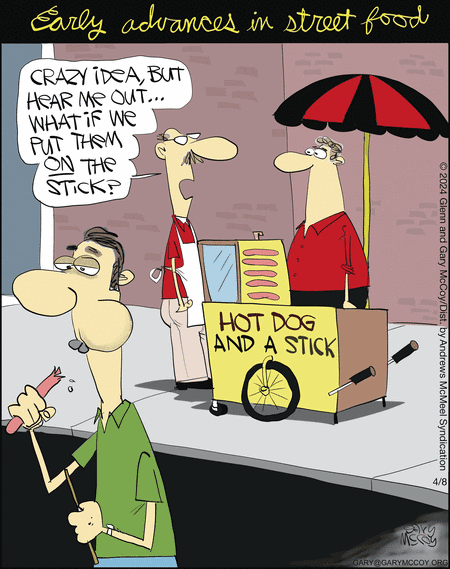
Lets begin with a personal laff I got from this Flying McCoys (AMS).
One of my jobs as a business writer in the late 80s was to cover openings and closings at the local mall. The publicity director there was a pal, but she had a job to do.
I wrote an update on the food court that included a new vendor, whom I referred to as the “redundantly named ‘Corn Dog On A Stick’,” which earned me a call from Amy telling me that the mall was very upset.

I replied that the name was redundant, that corn dogs are, by definition, on a stick, but offered to take it back if it turned out that the place was selling corn dogs on two sticks. She laughed, but said she had her orders.
We ran neither a correction nor a clarification.
She got out of there as soon as she could, but not before her boss was fired. I had gotten hold of blueprints for a strip mall the developers of his mall were building, and was able to confirm their anchor stores.
I called him and he said he had no comment. They fired him for saying he had no comment.
I assume they’d have also fired him if he’d had a comment. Fun place to work.
I covered foreign commercial exchanges, tracked housing sales, explained insurance and investigated dioxin discharged into Lake Champlain. Covering the mall was the comic relief that lightened my load and occasionally gladdened my soul.
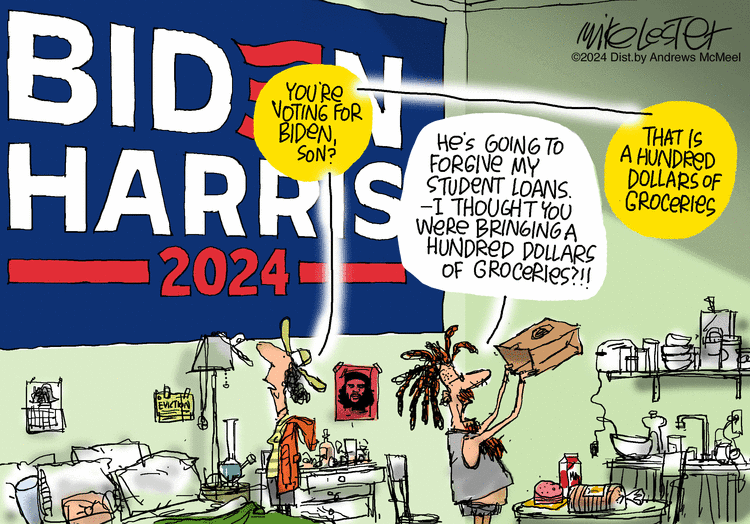
This is more up my usual alley: Mike Lester (AMS) discusses Biden’s student loan forgiveness efforts and the cost of groceries, which I’m pretty sure aren’t connected.
Except that commentators seem convinced that only recent graduates have outstanding student loans, and, if that were true, neither Biden nor anyone else would fuss over it.
However, the kid’s mother is probably still paying off her student loans, which is why she has trouble affording groceries and has an eviction notice on her wall, or possibly his. Mox nix.
Paying off student loans will add a burden for taxpayers, but it will also free up recipients to spend that money on things like rent and groceries plus a whole lot of other stuff.
In other words, it will boost the economy, offsetting its impact as debt.
Meanwhile, there are other ways to save tax money while boosting consumption, as seen in this
Juxtaposition of the Day
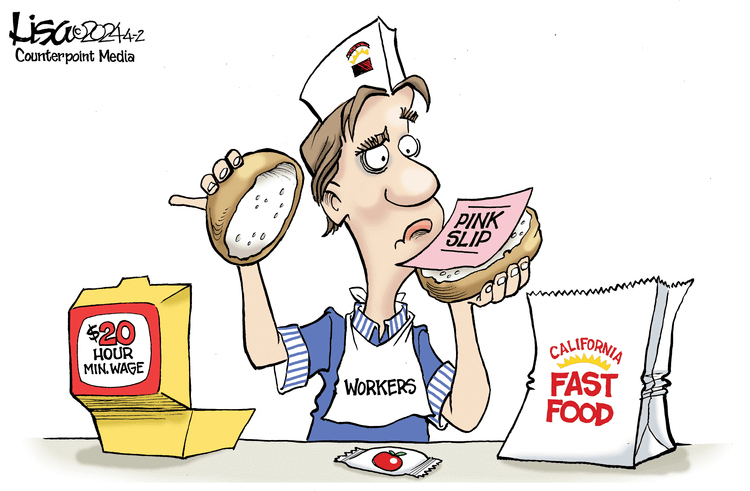
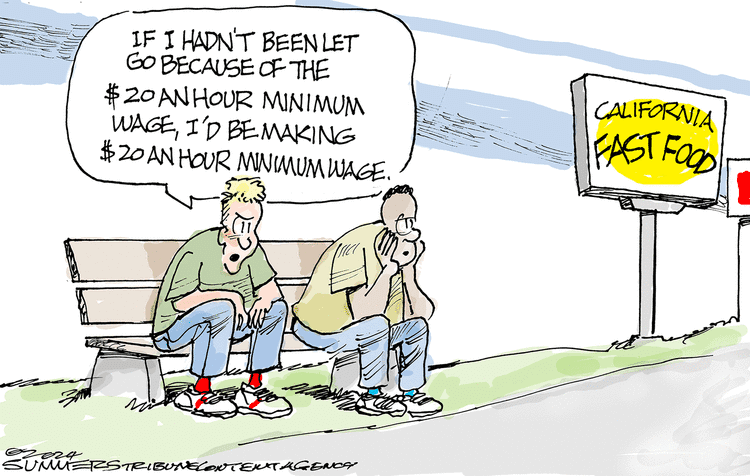
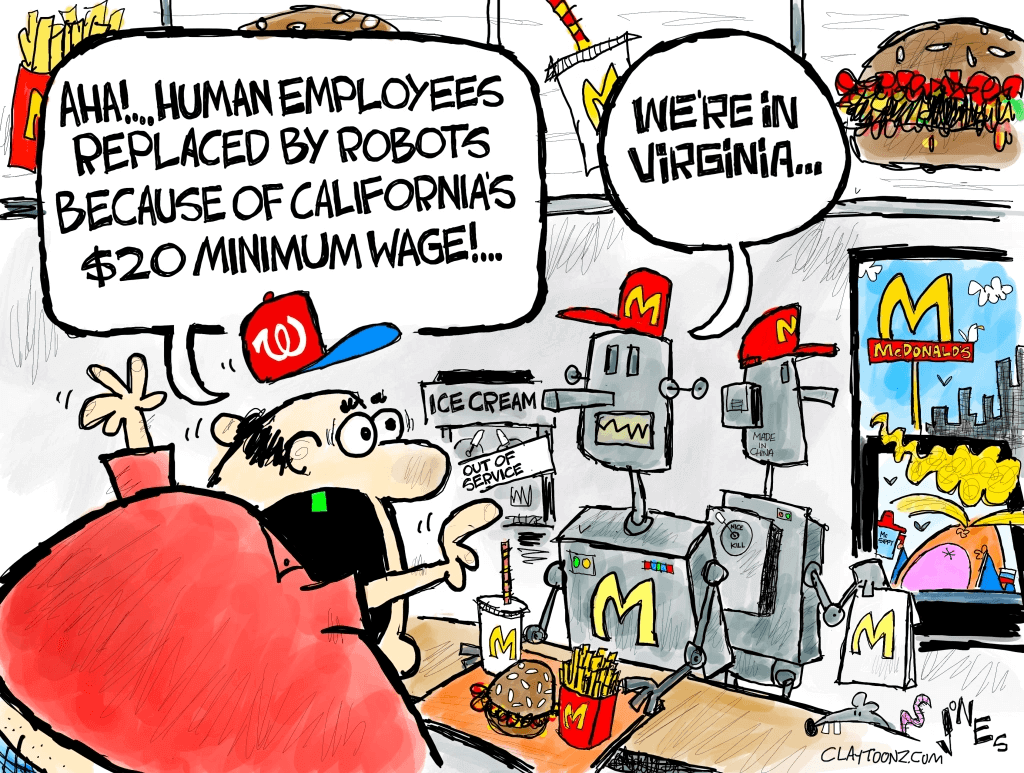
Benson echoes a familiar attack that Jones rejects. The Congressional Budget Office concedes that raising California’s minimum wage would likely result in some layoffs, but the percent seems small and, given the low unemployment rate, it seems unlikely many people would remain jobless, though that’s hardly Summers’ point.

Here are some graphs, but don’t bother trying to read them on your screen. Not only are they too small to really see, but you can get larger versions here, and they’re interactive, so you can explore various scenarios and see how things play out.
Including getting people out of poverty and off relief. Going back to student loan forgiveness and the burden on taxpayers, bear in mind that a large number of minimum wage workers are on welfare, which means that taxpayers are subsidizing inadequate wages, allowing businesses to pay less.
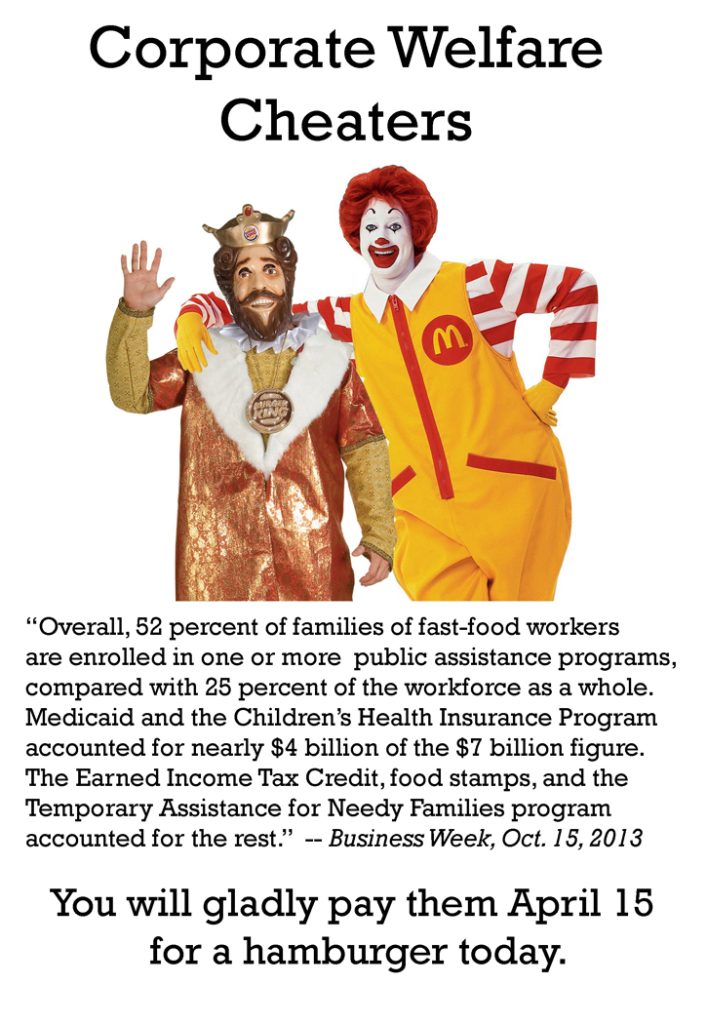
It’s known as “corporate welfare” and some of it is coming out of your pocket in five days and the rest will add to the deficit, but the people who own the fast food restaurants are thrilled to have your assistance in paying their staffs.
And please don’t think this stuff is boring. It’s complex, but parts of it are amusing. For example:
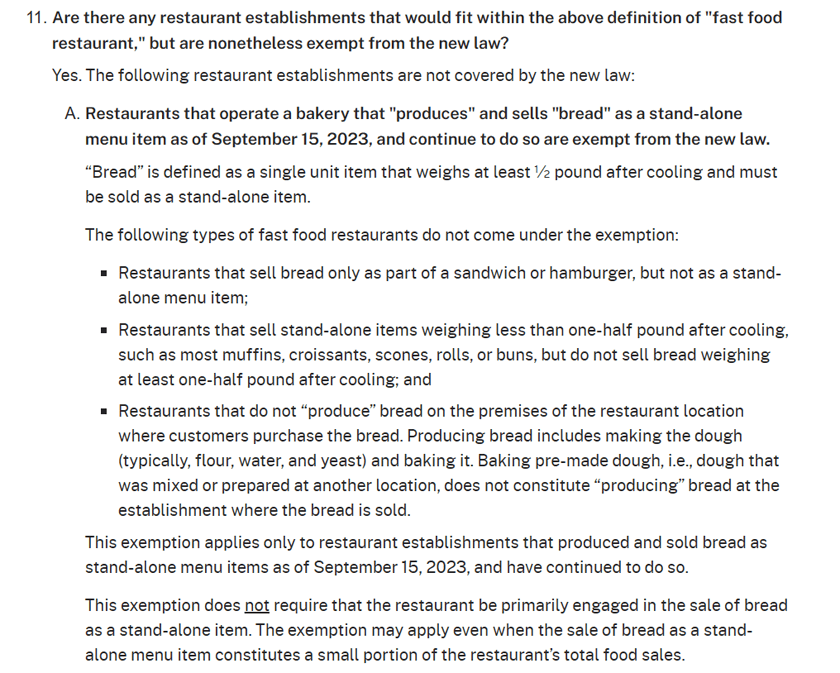
My opinion is that they should allow an exception for restaurants that sell corn dogs without sticks, but only if they have been selling them as stand-alone items as of September 15, 2023 and have continued to do so.
In any case, as Jones notes both in his cartoon and in the essay that goes with it, it’s not as if Corporate weren’t already trying to find ways to increase their profit margins through automation. Between self-serve checkout lanes, self-order kiosks and apps that let you create your own fast-food meal before you even get to the place, they’ve cut human interaction to a minimum.
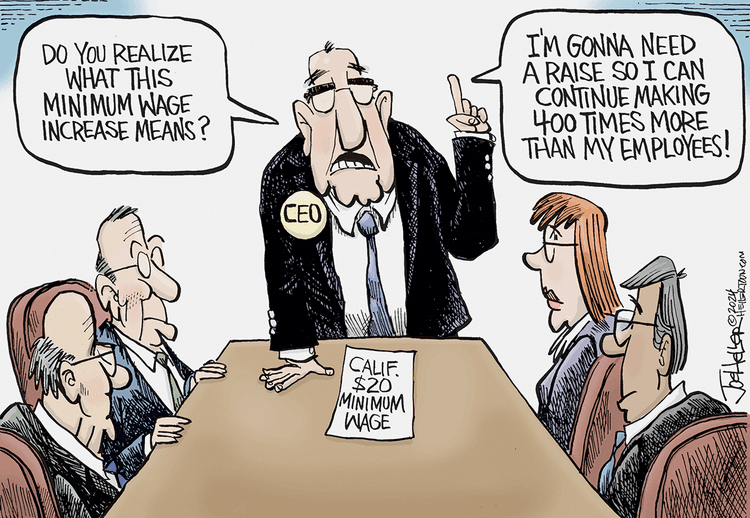
Clay Jones suggests that, if CEOs are concerned about corporate profits, maybe they could take a cut in their multimillion dollar paychecks, but Joe Heller suspects that that isn’t how things are likely to play out.

To paraphrase the words of Ronnie and the Daytonas, “Little CEO, you’re really looking fine!”
Though to be fair, Heller’s CEO says 400 times when according to Statista, it’s only 344 times. As of two years ago.
But hang on, because Dear Leader promises that, when he gets back in the White House, he’s going to slap tariffs on all sorts of imported things. Mr. Art of the Deal appears to think that tariffs are paid by exporters, but that’s only because he has no freaking idea how anything works, which might explain his ongoing chain of bankruptcies.
Tariffs are paid by consumers, and in the 19th Century, the government was run almost entirely on income from tariffs, which was great for the government and encouraged domestic industry, but was very hard on consumers.
The income tax was imposed to spread the cost of government more fairly, so that more wealthy people initially paid proportionally more than less wealthy people.
But if Trump gets his way, we’ll go back to leaning far harder on middleclass and lower income citizens.
Those who blame Biden for increased grocery prices are gonna just love Trumpenomics:
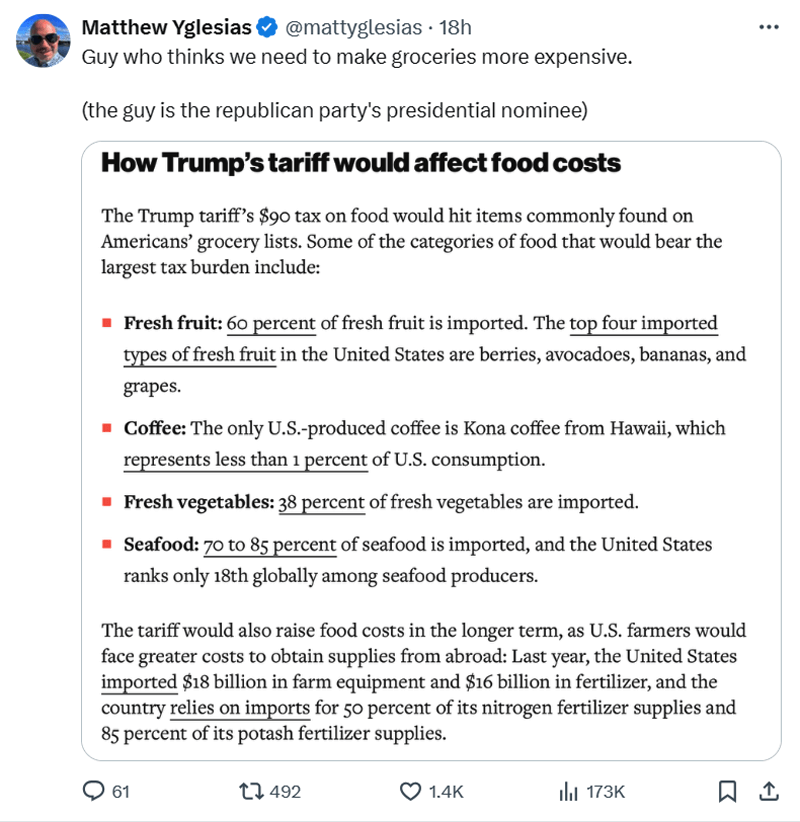
Now, I never took a survey to find out, but I’m going to guess that more subscribers read my update on corn dogs on sticks than bothered to wade through my more extensive and well-researched articles about the US/Canada Free Trade Agreement.
If you apply that local concept to the entire country, you’ll end up with a good explanation of how we got to where we are.
You can lead a horse to water, but you can’t make him think.

The grammatical point being that, while “Corn Dog on a Stick” may be redundant, “Stable Genius” is an oxymoron.
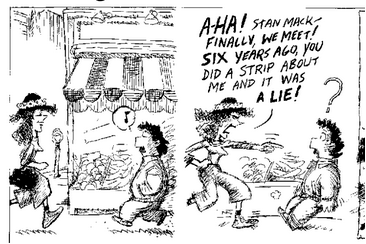
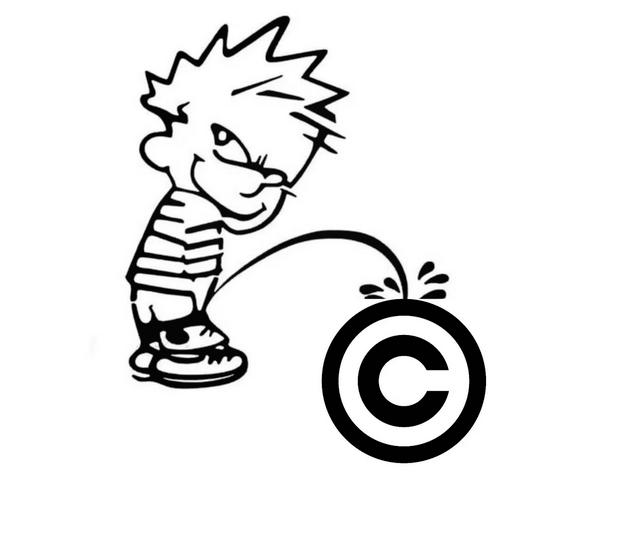
Comments 9
Comments are closed.